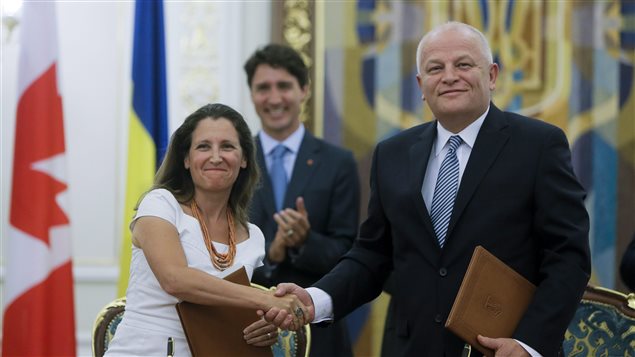Fresh on the heels of signing a landmark free trade agreement with the European Union, the Liberal government of Prime Minister Justin Trudeau has introduced legislation to implement a far less controversial free trade deal with Ukraine.
“We are one step closer to being able to reap the benefits of the Canada-Ukraine Free Trade Agreement (CUFTA), which will generate opportunities for Canadians and Ukrainians alike,” International Trade Minister Chrystia Freeland said in a statement today is she introduced legislation to ratify the deal . “It will boost our economies, spur innovation and strengthen the middle class and those working hard to join it.”
The Ukrainian Canadian Congress, an umbrella group of all the national, provincial and local Ukrainian Canadian organizations, “warmly” welcomed the introduction of legislation for the implementation of CUFTA.
“This agreement is a win-win for both our countries and will open up new opportunities in investment and trade,” said a statement from the UCC. “CUFTA will also provide stimulus for further economic reforms in Ukraine and will strengthen the deep bonds between the people of Canada and Ukraine.”
Eliminating all tariffs
When agreement enters into force, Canada will immediately eliminate duties on 99.9 per cent of imports from Ukraine, the government said.
Ukraine, on the other hand, will eliminate tariffs on approximately 86 per cent of Canadian exports, with the balance of tariff concessions to be implemented over a period of up to seven years, officials said.
When it enters full force, CUFTA will essentially eliminate all tariffs on goods currently traded between Canada and Ukraine.
According to government statistics, in 2015, despite the ongoing conflict in Eastern Ukraine, bilateral trade between Canada and Ukraine increased by 14 per cent over 2014 totalling almost $278 million.
Canadian exports to Ukraine, which included pharmaceuticals, fish and seafood, and coking coal, totalled approximately $210 million.
Canada imported more than $67 million worth of goods from Ukraine in 2015, including fertilizers, iron and steel, and anthracite coal.
Ties that bind
Freeland and Ukraine’s First Vice Prime Minister Stepan Kubiv, signed the agreement in Kyiv on July 11, 2016, during Prime Minister Justin Trudeau’s first official visit to the country.
Canada has long-standing ties with Ukraine.
An estimated 1,250,000 people of Ukrainian origin live in Canada, making them Canada’s ninth largest ethnic group and giving Canada the world’s third-largest Ukrainian population behind Ukraine and Russia.
Canada has been one of the staunchest supporters of Kyiv in its conflict with Moscow over the Russian-supported insurgency in the Donetsk and Luhansk regions of Eastern Ukraine.
Freeland herself was among 13 Canadian politicians and activists who were banned from entering Russia in March 2014, in the Kremlin’s retaliation for their role in supporting anti-Russian sanctions by Ottawa.
Ottawa has also dispatched about 200 hundred Canadian troops to Ukraine to help train the country’s military to take on the pro-Russian rebels in Eastern Ukraine.







For reasons beyond our control, and for an undetermined period of time, our comment section is now closed. However, our social networks remain open to your contributions.